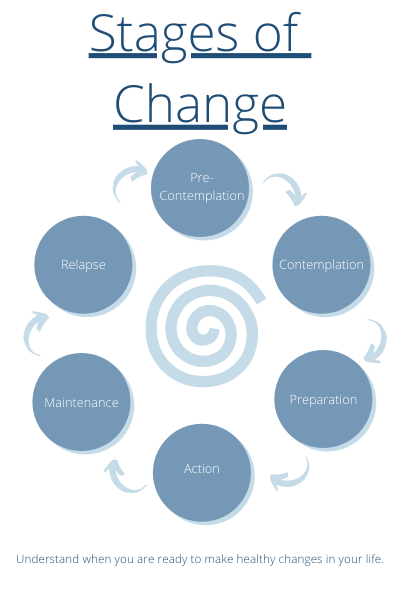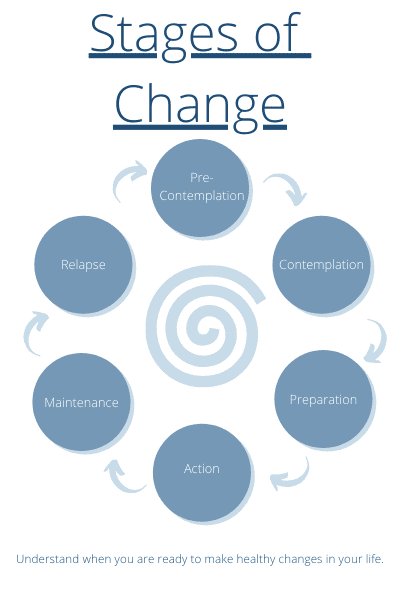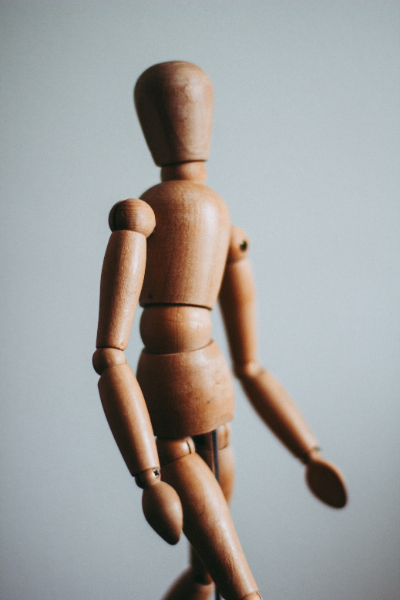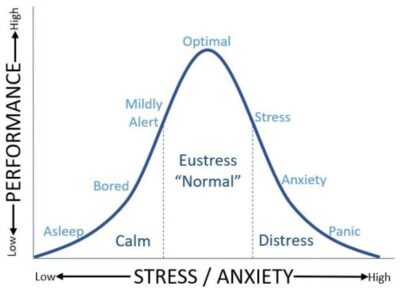Are You Ready to Change?

Your lifestyle is made up of performed behaviors. Throughout the day you are CONSTANTLY making decisions about whether or not you are going to engage in certain behaviors.
Frustration can occur when your goals are not aligned with your actions.
How do you know when you are ready to make a change in your life? Have you ever tried to make lasting change, but found yourself spinning in circles? Maybe you made a change for a short period of time, but then became frustrated by the lack of gain and gave up? Building awareness is the first step. Before we can overcome the endless cycle, we must become aware of who we are, how we think, and the ways we behave.
Stages of Change
There are 6 categories making up the Stages of Change model. We can literally apply this model to any behavior we want to increase or decrease. Understanding whether you are fully ready to make a change is important as you move from surviving to thriving.
As we go through the different categories, I encourage you to choose a specific behavior you want to either increase or decrease. Some example could be…eating healthier, working out more, decrease smoking/alcohol use, reaching out to your family more frequently, etc. Then determine what stage you are in based on the below categories.

1. Pre-Contemplation Stage
No intention of changing the behavior
When you are in this stage, you have absolutely no intention of changing your behavior. You may not even be aware that you have a problem. For example, maybe someone is overweight such that their health is in jeopardy of serious medical problems, but yet they don’t plan to eat healthier or exercise to lose weight. Another example could be the chain smoker who develops lung issues but who has no interest in quitting.
2. Contemplation Stage
Aware of a problem but no commitment to change
In this stage, you are aware that you have a problem, but you haven’t committed to any form of change. For example, you may be aware that your alcohol use impacts your relationships with other people in an unhealthy manner, but you continue drinking the same amount with no specific plan to change.
3. Preparation Stage
Intention to make a change
In this stage, you recognize you need to make a change, are wanting to change, and start believing you can change. At this stage, you are just thinking about the change with some pre-work, not taking active steps towards achieving it. For example, you may start getting motivated to workout and call a few gyms, but are not actively working out.
4. Action Stage
Active change in behavior
In this stage, you are actively changing your behavior in a healthier manner. This is where much of the work happens. If your identified behavior change was to work out more, then you are now going to the gym, running in your neighborhood, etc. If your identified behavior is to decrease alcohol consumption, then you have stopped buying alcohol and found an alternative non-alcoholic drink instead.
5. Maintenance Stage
Sustainment
This is one of the hardest stages. You successfully accomplished your behavior change and are now engaging in a new, healthier behavior. The difficulty is that this new behavior must be sustained. For example, someone who lost 15 pounds from working out now must keep off that weight.
Have you ever accomplished a goal, but found yourself slowly sliding back into your old patterns? This slippery slope is easy to fall back to if we aren’t careful and consistent. The other difficulty with this stage is that it can last for years or decades. Someone who successfully quit drinking due to an alcohol addiction in the Action stage, could be in the maintenance stage of alcohol recovery for the rest of their life.
6. Relapse
Falling back into the old behavior
Relapse can be common. In this stage, we cycle back to our old behaviors and neglect our new changes. We have all experienced relapse of a behavior change in our lives. Maybe you started a new diet, but then quit or slid back to your old eating habits. Maybe you successfully stopped smoking, but then after being hit with a stressful week, you relapsed and started smoking again.
It is important that we LEARN from our experience with each relapse. Learning from our downfalls allows us to grow stronger and more resilient so that the next time we are able to better handle the situation.
How to Succeed at Change
As we talk about changing specific behaviors, success depends on what stage we are currently in. If you are in the pre-contemplation or contemplation stage of changing a behavior then you may not be successful at changing the behavior. You are more likely to be successful if you are actively engaged in changing the behavior and have strong intentions to continue in a healthier behavior change.
Consider the behavior that you reflected upon earlier in this article. What stage are you in? If you are in one of the earlier stages, identify some steps you can take to move into the next stage. If you are in one of the latter steps, identify what is going well and what barriers or challenges you are facing.




